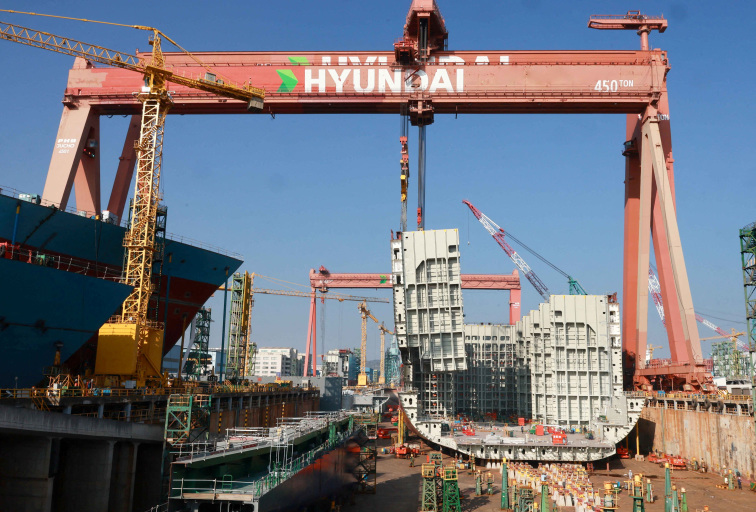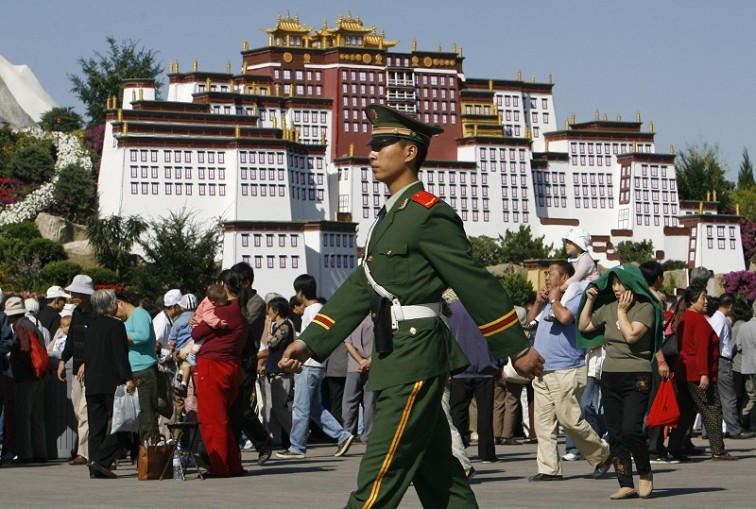Dark clouds hang over Tiananmen Square in Beijing. (Lintao Zhang/Getty Images)
[People News] In the CCP’s terminology, people who have failed in investment, lost in life, suffered broken relationships, fallen into psychological imbalance, or become mentally unstable are labelled as “Five Losers”. These five groups are causing considerable headaches for Xi Jinping. On September 1, The Wall Street Journal reported that the authorities have stepped up monitoring of these “Five Losers.” On the surface, it appears to be about offering care and assistance, but in reality, it is surveillance and stability maintenance. The regime views these groups as unstable elements that threaten public order.
According to the September 1 WSJ report, the CCP’s newly created Central Social Work Department is penetrating grassroots communities. While it claims to provide support to vulnerable “Five Losers,” in practice, it strengthens surveillance through data collection and security cameras to ensure these issues do not turn into public order threats.
Some of the department’s senior officials have been drawn from the state security and public security systems, and many of its local offices are managed directly by law enforcement or placed under their supervision.
In March 2023, the CCP announced its “Party and State Institutional Reform Plan,” which included establishing the Central Social Work Department to oversee petition work. Officially, it is tasked with drafting social work policies, strengthening grassroots governance under Party leadership, and consolidating local political power. Provincial, municipal, and county Party committees were also ordered to set up their own social work departments, absorbing responsibilities previously handled by the “Two New” Work Committees under Party organisation departments.
In reality, the current Central Social Work Department revives an earlier institution. Back in 1939, during the Yan’an period, Mao Zedong established the Central Social Department and the Central Intelligence Department, with Kang Sheng as minister, to handle intelligence and counterespionage work. Later, during the Yan’an Rectification Movement, tens of thousands of cadres were falsely accused as spies, traitors, and undercover agents—charges fabricated by this very department. It wasn’t disbanded until 1949.
Commentator Cai Shenkun wrote in Radio Free Asia that this department is not as simple as it looks: it penetrates every corner of society. The CCP has long feared that ordinary people are a problem, unsure of what citizens are thinking or planning. This department’s main function is to ferret out more “enemies” within society, divide them, and neutralise them.
Cai believes the department’s integration into grassroots Party structures is highly significant: “Its reach extends into every grassroots government without exception, including all civic groups, social organisations, and business associations.”
In November 2023, a deadly car-ramming attack in Zhuhai killed 35 people and injured 43. Reportedly, Xi Jinping was furious—not only ordering harsh punishment for the perpetrator but also demanding stronger social control. He ordered a nationwide sweep of the “Four No’s” and “Five Losers” populations to eliminate social risks at their root.
Wu Se-chih, a Taiwan think tank advisor and director of the China Research Centre, commented on RTI that this demonstrates the CCP is expanding internal repression. Xi shifts the blame for violent social incidents onto the people, making them scapegoats for social instability—instability that ultimately threatens the regime itself.
In December 2023, a user on China’s social platform Xiaohongshu posted a screenshot of an internal work chat instruction. It showed local Party branch secretaries being ordered to identify “life failures”, verify their backgrounds, and report updates to higher authorities every two weeks.
Local governments and law enforcement directives also instructed companies to monitor employees perceived as having suffered life setbacks.
According to Freedom House’s China Dissent Monitor, protests in China significantly increased last year, mostly due to economic grievances. Reports of knife attacks, vehicle assaults, and other incidents often described the perpetrators as facing financial problems, psychological struggles, or family tensions.
Li Qiang of China Labour Watch argued at the department’s founding that the key to preventing violence lies in genuine poverty alleviation and welfare investment—helping low-income groups weather the economic downturn: “That’s the core solution.”
But compared with the U.S. and Europe, the CCP government provides relatively little social security, with limited aid for unemployment or health emergencies.
Holly Snape, a political science lecturer at the University of Glasgow, noted that in the past, the CCP allowed some civil society groups to discuss social and environmental issues and propose solutions. But under Xi Jinping, such organisations have been crushed, with any action independent of the CCP viewed with suspicion.
The Social Work Department’s focus also includes China’s 200 million gig workers, a group more difficult for the CCP to monitor than factory or state enterprise workers, and increasingly the source of labour unrest.
In November, CCP General Office chief Cai Qi declared that strengthening Party presence among these groups was a top priority in social work, especially Party-building efforts among emerging and fast-growing labour populations.
Some local governments are setting up community centres where gig workers can access drinking water, childcare, and phone charging. At the same time, they are encouraged to become part-time “grid managers” —essentially “mobile surveillance units”—tasked with reporting anomalies and gathering public sentiment.
One Beijing blogger even considered accepting the “Five Losers” label, thinking it might bring him government aid. But after learning they were being monitored as unstable elements, he grew wary. He wrote: “This is not solving the problem, but solving the victims of the problem.”
Another Guangdong blogger criticised the monitoring on WeChat: “The current governance logic isn’t about what help you need. It’s only about ensuring you can never pose a danger to society.”
Wu Se-chih concluded that ultimately, the CCP itself is the root cause of these problems. A lack of political and social openness explains why authoritarian regimes inevitably fail. △











News magazine bootstrap themes!
I like this themes, fast loading and look profesional
Thank you Carlos!
You're welcome!
Please support me with give positive rating!
Yes Sure!